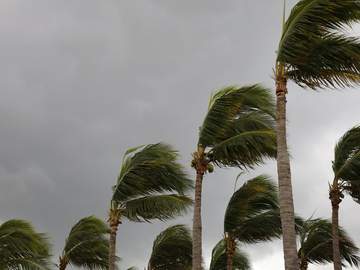
‘K-pop’
K-pop showed a dramatic increase in lookups last week, after a popular movie, KPop Demon Hunters, began to move from being viewed on streaming services to being viewed in theaters.
How KPop Demon Hunters Conquered the World
— (headline), Time, 21 Aug. 2025
K-pop is “popular music originating in South Korea and encompassing a variety of styles.” The K portion is an abbreviation of Korean; the pop portion means “popular music,” and is a shortening of popular, which can be traced back to the Latin populāris “liked by the general public.”
‘Hurricane’
A large storm has been moving north since last week, increasing the number of searches for hurricane.
Hurricane Erin unleashing dangerous surf, rip currents along 2,000 miles of East Coast
— AccuWeather.com, 19 Aug. 2025
Hurricane entered English in the 16th century from the Spanish huracán, and comes ultimately from the Taino word hurakán. We define hurricane as “a tropical cyclone with winds of 74 miles (119 kilometers) per hour or greater that is usually accompanied by rain, thunder, and lightning, and that sometimes moves into temperate latitudes.” Although hurricane has traditionally been used especially when naming or referring to storms occurring in the western Atlantic, it is used for storms in the northeastern Pacific as well.
‘Leniency’
Often when a well-known person passes away a specific word will appear in many of their obituaries. In the case of the much beloved jurist, Frank Caprio, that word was leniency.
Famous for his “Caught in Providence” TV show, the judge’s leniency often provided a lifeline to people when they needed it most.
— The Boston Globe, 20 Aug. 2025He said he leaned on “the rule of common sense” when considering leniency toward defendants and did not view verdicts that made the defendant’s life worse as justice.
— Time, 21 Aug. 2025Often dubbed the “Nicest Judge in the World,” Caprio became a viral sensation for his empathetic courtroom demeanor—dismissing tickets for struggling families, offering heartfelt advice, and showing leniency grounded in humanity.
— Business Today, 21 Aug. 2025
Leniency is the quality or state of being mild and tolerant, and of not being harsh, severe, or strict.
‘Deepfake’
Deepfake saw more traffic than usual last week, after Senator Amy Klobuchar wrote an opinion piece in The New York Times warning of dangers associated with this form of technology.
There's a centuries-old expression that “a lie can travel halfway around the world while the truth is still putting on its shoes.” Today, a realistic deepfake—an A.I.-generated video that shows someone doing or saying something they never did—can circle the globe and land in the phones of millions while the truth is still stuck on a landline.
— Amy Klobuchar, The New York Times, 21 Aug. 2025
A deepfake is “an image or recording that has been convincingly altered and manipulated to misrepresent someone as doing or saying something that was not actually done or said.” The fake portion of the word is fairly self-explanatory (it comes from the sense of that word meaning “not true, real, or genuine”); the deep portion is influenced by deep learning—that is, machine learning using artificial neural networks with multiple layers of algorithms.
Word Worth Knowing: ‘Solivagant’
Our word worth knowing this week is solivagant: “marked by solitary wandering.” It shares a root, the Latin vagus (“wandering”), with a number of other English words, such as noctivagant (“night-wandering”), mundivagant (“wandering over the world”), and vague (“not clearly expressed”).




